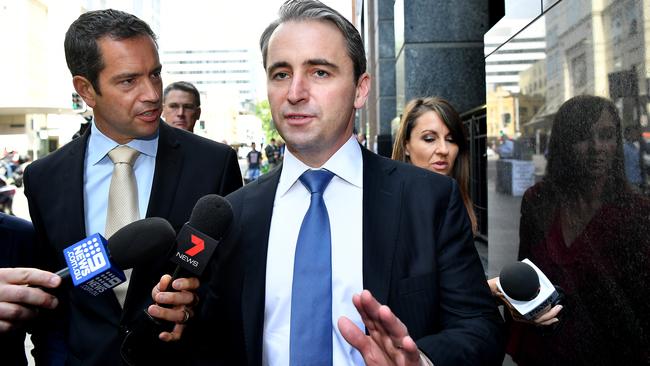CBA CEO Matt Comyn warned of compensation risk
Matt Comyn warned CBA might have to compensate ripped-off term deposit customers, as he wrote a pitch for the CEO job.

Matt Comyn told Commonwealth Bank chair Catherine Livingstone the bank might have to pay compensation for ripping off term deposit customers in a letter pitching for the chief executive’s job at Australia’s biggest financial institution, royal commission documents reveal.
The rip-off, which involved failing to tell term deposit customers they would get a much lower rate once a promotional period expired, spread across the banking industry in the mid to late 2000s after the corporate regulator investigated CBA over it but took no action.
Late last year The Australian revealed that the Australian Securities & Investments Commission killed the investigation in 2010 despite legal advice that it had a strong case against the bank.
It is estimated the rort cost customers across the industry as much as $200m a year, but The Australian is unaware of anyone ever being compensated.
In his January 1 email to Ms Livingstone, published by the financial services royal commission on Friday, Mr Comyn, who was at the time head of CBA’s retail bank, effectively applied for the chief executive job then held by Ian Narev.
In the email, Mr Comyn, who went on to take the top job in April, listed the term deposit issue among things pre-dating his time atop the retail bank, “where under today’s scrutiny both our actions and the actions of the regulators may seem inadequate”.
“Given the recent interest from The Australian regarding our term deposit pricing strategies prior to 2011, we should expect they will also come under scrutiny,” he told Ms Livingstone.
“There is risk here of further compensation being required, but as long as we act swiftly to rectify issues, we should be able to limit the damage.
“We would include some of these issues in the scope of the independent review to prepare for the royal commission.”
ASIC launched its investigation into CBA in 2006 after receiving complaints in 2005, and continued it as the volume of term deposits surged through 2008 and 2009 when investors fled volatile equity markets in favour of safer products.
However, despite its legal advice, the regulator, then run by chairman Tony D’Aloisio, decided to kill the investigation in March 2010.
It instead conducted an industry-wide survey of term deposits that resulted in banks pulling back from practices ASIC felt were misleading.
Spokesmen for CBA and ASIC declined to comment.
Other issues Mr Comyn put in the same category as the term deposit rort included the bank’s conduct over the Storm Financial scandal, where the bank loaned money to customers tipped into high-risk investments by the Townsville-based Storm.
In 2012, under a deal with ASIC, CBA paid $136m in compensation to Storm customers.
He called out lax lending standards before 2012 and “several employees (mostly lenders) that were dismissed between 2009-2011, and some of these cases involved fraud and customer detriment”.
“One of the lenders involved was the largest mobile lender nationally and had received a number of CEO and RBS awards — unfortunately an attractive media story.”
It is unclear which mobile lending scandal Mr Comyn was referring to, as the bank has been beset by scandal in the area over recent years.
Melbourne mobile lender Andrew Cameron has been charged with conspiracy to defraud and is to face trial next October over his alleged involvement in 121 allegedly fraudulent loan applications, worth about $36.4m, connected to finance company Myra Home Loans.
Another Melbourne mobile lender reportedly confessed to the bank about his role in $3.5m of loan fraud, and spending some of the proceeds on lunches and cocaine, but was not reported to police until exposed by media reports earlier this year.



To join the conversation, please log in. Don't have an account? Register
Join the conversation, you are commenting as Logout